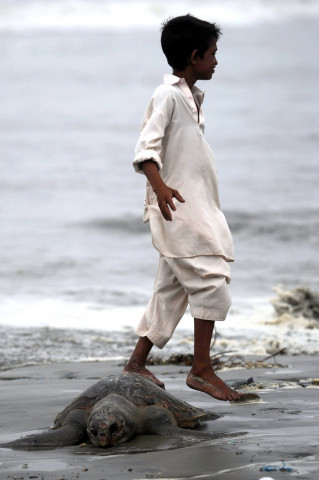Industries without treatment plants will be sealed, warns judicial commission
No release of untreated sewage into sea after 2020, assures DHA

According to Justice (retd) Amir Hani Muslim, the release of untreated sewage into the sea was destroying marine life. PHOTO: AFP
During its hearing in Karachi on Monday, the commission gave three months to HM Extract and Ghee Mill, Raiwind Chemical Industries, Tufail Chemicals Private Limited, Wali Oil Mill, Kausar Ghee Mill and Rasul Food industries for the installation of in-house effluent treatment plants. HM Extract and Ghee Mill was also ordered to pay a Rs500,000 fine to the PQA in 15 days.
Five other industries were given two months for the installation of the required sewage treatment apparatus. The judicial commission also issued bailable arrest warrants for the owner of National Textile Foundation for not appearing before it despite repeated notices. Most of the industries in the PQA have been releasing untreated effluent directly into the sea.
Senior research officer of Pakistan Council of Research on Water Resources Dr Ghulam Murtaza was directed by the commission to inspect Pak Arab Refinery whose claim of having built a treatment plant was contested by the Sindh Environmental Protection Agency and PQA at the hearing.
The commission head, Justice (retd) Amir Hani Muslim pointed out that industrialists had serious complaints regarding the lack of drainage infrastructure in the Port Qasim Authority's (PQA) industrial zone. He asked PQA General Planning and Development Director Dr Kazim Jatoi to resolve the issue within two months by constructing new sewerage lines where they were required and connecting the industries with the zone's drainage system.
Notification replacing municipal commissioner stirs hornet’s nest
DHA treatment plants
Justice (retd) Muslim also directed the Defence Housing Authority (DHA) to make functional its drainage system and sewerage treatment system.
The DHA assured the commission head that it would stop releasing untreated sewage into the sea from three of the DHA's phases by April 2019.
The rest of the DHA's phases will be linked to treatment plant IV by 2020, the housing authority assured the judicial commission. Justice (retd) Muslim ordered the DHA to increase the capacity of its treatment plant, Qublai Khan, from 1.5 million gallons per day (MGD) to 2 MGD and to complete the project by April, 2019.
The commission head further directed the authority to integrate the drainage system of DHA phases I, II, II extension, VII and VII extension with the greater Karachi sewerage treatment project, named S-III. However, this would be subject to the consent of S-III Project Director Noor Ahmed Samo. The DHA will also have to pay the Karachi Water and Sewerage Board (KWSB) for these services.
For the supply of additional drinking water for DHA, the commission observed that it was dependent on the availability of water in the KWSB system. The Cantonment Board Clifton (CBC) was directed to install flow meters to measure the existing water supply from KWSB. The commission also directed the CBC to clear arrears of the KWSB within one month.
"The commission appreciates the efforts made by DHA and cantonment boards ... shall have far reaching effect on the public in Karachi," Justice (retd) Muslim observed.
The commission also put on notice the federal power secretary for July 6 with regard to energising water supply and drainage schemes in Karachi and rest of Sindh.
Judicial commission stops authorities from throwing waste into the sea
Tree plantation
To combat climate change in the city, Justice (retd) Muslim advised the authorities to encourage the people of DHA to plant trees like neem and amaltas. Citing the example of Dubai, he remarked that Dubai started receiving rains when people started planting trees.
The KWSB managing director pledged that the water board would plant 10,000 trees. Justice (retd) Muslim also stated that he would himself plant a neem tree on Monday.
Water woes
Residents of Gulistan-e- Jauhar and Baldia Town informed the judicial commission about the continuous water crisis in their areas. They complained that the KWSB was behaving indifferently to their woes and they were being charged exorbitant rates to get water.
This irked the commission head who remarked what was happening in the city. He directed the authorities concerned to submit a report on this.
The residents of Baldia Town lamented that their locality had not been receiving water for the last 12 years. The focal person also admitted that the water issue had been persisting in the area. He informed the commission that the issue could be resolved by installing public tanks.
Later, Justice (retd) Muslim visited the fisheries. He sought explanation from Fisheries Chairperson Hafiz Abdul Razzaq about the poor state of cleanliness at the fisheries. Marine life is being destroyed due to pollution and the authorities seem not bothered about it, he remarked. The commission head summoned the fisheries chairperson with record.



















COMMENTS
Comments are moderated and generally will be posted if they are on-topic and not abusive.
For more information, please see our Comments FAQ